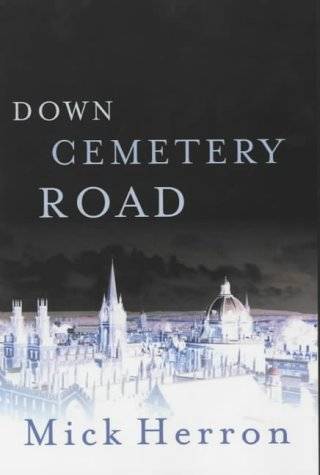

|
Where I get my ideas fromMick Herron, author of DOWN CEMETERY ROAD published by Constable Robinson© Mick Heron |
Photo © Steve Gibbons
 There’s probably little more dangerous a writer can do than reveal the origins of his or her novel - too much information exposes the gap between intention and achievement, and reveals the finished work for the ragbag of incomplete patterns and secondhand notions the author secretly fears it is. Best to keep all that under wraps. The reason why “Where do you get your ideas from?” is a recurring question is that no self-respecting writer dares answer it properly. Don’t expect me to, either.
There’s probably little more dangerous a writer can do than reveal the origins of his or her novel - too much information exposes the gap between intention and achievement, and reveals the finished work for the ragbag of incomplete patterns and secondhand notions the author secretly fears it is. Best to keep all that under wraps. The reason why “Where do you get your ideas from?” is a recurring question is that no self-respecting writer dares answer it properly. Don’t expect me to, either.
But, given that books happen, ideas presumably occur. Philip Larkin wrote that when a poem suggested itself to him, it brought with it a hint of how it should be written - usually its first or last line, and the form it would take: quatrains, free verse, whatever. (I’m paraphrasing madly here.) Similarly, before I started Down Cemetery Road (a title borrowed from Larkin), I knew it would be about a woman called Sarah, and that the whole story, though not in the first person, would be told from her perspective. I knew that Sarah would take it upon herself to solve some mystery or other - details to follow - and in so doing would unravel her own life, and wreak havoc on those around her. And I knew that the opening words would be taken from the list of fire instructions pinned to my door in college, years ago.
None of this counts as an idea. It’s more like picking up a ball without yet knowing what game you’re going to play. Though, of course - give or take the results-skewing variable of drunken enthusiasm - the game settled on is largely determined by the ball’s size and shape. The choice is not infinite.
 And the same goes for plots. Because, in order to have the time and inclination to look into whatever mysterious incident happened, it was obvious that my Sarah was going to have to be (a) bored and (b) not have (i) a job or (ii) children, but (c) not be desperate about (b)(i) (though (b)(ii) might be an issue) and therefore (d) must have a husband/partner earning enough for both of them, and unbothered that she wasn’t working. This in itself indicated that (e) he must have a pretty hefty job (and therefore that (f) they’d live in a nice neighbourhood), and also, perhaps, that (g) he’d have views on (b)(ii), which meant she had to have opposing views, otherwise it wouldn’t be an issue. And the hefty job would be another one, because Sarah was naturally going to (h) resent his being the money earner, because of (i) the control thing, plus (j) having to entertain his rich clients. (This was always happening in The Good Life, I remember.) And whatever happened to shake all this up was going to have to be (k) pretty noticeable, but at the same time (l) able to be passed off by “them” - whoever “they” turned out to be, which was not a Chapter One problem - as an unfortunate accident (because otherwise there’d be proper, uniformed people investigating it).
And the same goes for plots. Because, in order to have the time and inclination to look into whatever mysterious incident happened, it was obvious that my Sarah was going to have to be (a) bored and (b) not have (i) a job or (ii) children, but (c) not be desperate about (b)(i) (though (b)(ii) might be an issue) and therefore (d) must have a husband/partner earning enough for both of them, and unbothered that she wasn’t working. This in itself indicated that (e) he must have a pretty hefty job (and therefore that (f) they’d live in a nice neighbourhood), and also, perhaps, that (g) he’d have views on (b)(ii), which meant she had to have opposing views, otherwise it wouldn’t be an issue. And the hefty job would be another one, because Sarah was naturally going to (h) resent his being the money earner, because of (i) the control thing, plus (j) having to entertain his rich clients. (This was always happening in The Good Life, I remember.) And whatever happened to shake all this up was going to have to be (k) pretty noticeable, but at the same time (l) able to be passed off by “them” - whoever “they” turned out to be, which was not a Chapter One problem - as an unfortunate accident (because otherwise there’d be proper, uniformed people investigating it).
By the time I’d realised that the opening scene was going to involve a somewhat tense dinner party interrupted by a nearby house exploding, no other course of events seemed possible. And since whatever happened next was ideally going to explain what had already occurred, the remaining choices grew more limited with every paragraph.
I’ll skip the details of the following eighteen months or so. They’re lost to memory, anyway. I’ve always been impressed by the way Goscinny & Uderzo kept count of how many bottles of beer they drank, and pencils they wore out, and sheets of paper they got through, while writing Asterix and Cleopatra, but chiefly by how many bottles of beer they drank. But since I can’t drink and keep count at the same time, a similar statistical analysis was never going to happen.
What I do remember, though, is that betrayals were made along the way. It became impossible to tell Sarah’s story from her viewpoint alone, if the reader weren’t to spend the whole journey as confused as she was. The opening words got pushed aside, to make room for a prologue. And, perhaps equally importantly, the original plot was binned on the second draft, and a new one shunted into place. There were other lessons learned too, of course; for example, that prophecy’s a doddle, provided you stick to the big picture - it was no great feat to foretell another Gulf War. But I never imagined there’d come a time when it would no longer be possible to walk onto the railway platform at Oxford without a ticket. And that really does stuff the plot’s credibility.
For the second book, The Last Voice You Hear, the starting point was, again, less an idea than a given. I wanted to write about love - death too, obviously, but mostly love. Not a love story, mind, but one about a man who insinuates himself into the lives of lonely women, promising them love, but removing all hope of it instead. And the woman investigating this would be someone for whom love had become a forgotten language; one she had to learn again along the way. It would be kind of moving, and pretty deep. The reader would have plenty of opportunity to nod sagely, and maybe a little sadly, while turning a page.
But I didn’t want it to be a one-note book, so I thought I’d put some ostriches in too. I like ostriches. On my incredibly detailed plan, I wrote “Chapter five - ostriches”, and even did some research (and when I hear that word, I reach for my security blanket). But this was easy: my very first website hit told me that ostriches stand about nine foot tall and weigh a lot. That’s the kind of heavy data we thriller writers thrive on. The rest, I could legitimately wing. Significantly less than seven seconds later, I had my ostriches: there would be three of them, and they would be called, um … Gwyneth, Nicole and Mr O. I’ll let you guess where I got the first two names. Mr O, though, was the one to watch: the answer to a friend’s remark that there were No Dependable Males in my first book. Nine foot tall and weighing a lot? How dependable can you get? Mr O was the real deal. (The girls, frankly, were fluff.)
Anyway: a long year later, four and a half sevenths of the way through the novel, and it was time to bring the ostriches in. And on the same day I started writing that scene - and I am not making this up - there it was, front page of The Times: the results of some research which showed that female ostriches tend to fixate - and we’re talking amorously, here - on their male keepers. You cannot buy this kind of luck. It was like the press was conspiring to promote thematic unity, and how often does that happen? In it went: an ostrich in love. Gwyneth was the lucky girl, though I’m using the word “lucky” loosely. Love - and I’m possibly not the first novelist to have brought this up - doesn’t always end happily.
Happily, though, novels do end. When this one did, I sent it off to my wonderful agent, who in turn sent it to my charming editor (I’m practising my Oscar speech, you’ll notice), and both liked it, I’m happy to report - but neither seemed to want to comment on my finely nuanced aperçus on the nature of love. (I can’t swear, in fact, that they’ve registered them.) Because mostly, they’re taken with the ostriches. And more specifically, with Nicole and Gwyneth - the eye candy.
It’s like Mr O doesn’t exist.
Which brings me full circle: it’s dangerous to reveal what your original idea was - if the word’s even appropriate - because you’ll look like an idiot when it turns out nobody noticed. Essentially, if anybody notices anything at all about your novel, even the fluff, you’re ahead of the game. So if, once The Last Voice You Hear is published (next July, by the way: Constable & Robinson), anybody remarks on Gwyn or Nicci, I plan to say “Yeah, I’d been looking for the right vehicle for the girls for a while,” and let it go at that. But if I find a particularly sympathetic ear, I might draw attention to those finely nuanced aperçus I mentioned, if I can remember where in the text I hid them. Or, at the very least, point out that it’s Mr O who’s the important ostrich.
That was the idea, anyway.

| Webmaster: Tony 'Grog' Roberts [Contact] |